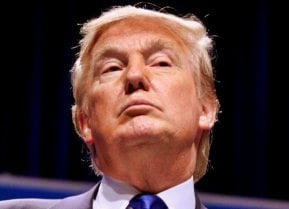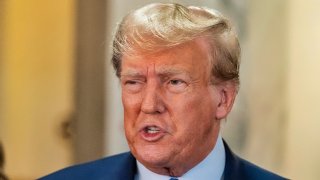Kamala Harris and Donald Trump: Who’s Really Flip-Flopping?
Who’s flip-flopping? Kamala Harris, who explained on CNN last night that she’s not opposed to fracking? Or Donald Trump, who seemed to suggest that he’ll vote to support abortion rights in Florida?
Who’s flip-flopping? Kamala Harris, who explained on CNN last night that she’s not opposed to fracking? Or Donald Trump, who seemed to suggest that he’ll vote to support abortion rights in Florida?
Harris isn’t catching much flak for her shape-shifting, other than a few feeble questions from Dana Bash on Thursday evening. Still, Trump is stirring outrage among certain precincts of the right that are bemoaning his lack of avidity for crushing what’s left of abortion rights. “I’m going to be voting that we need more than six weeks,” he said about Amendment 4.
His campaign then unsaid it. Karoline Leavitt, his press secretary, said, “President Trump has not yet said how he will vote on the ballot initiative in Florida, he simply said that he believes six weeks is too short.” Say what? In trying to walk back his remark, the Trump team underscored that the issue of abortion continues to give his campaign fits.
Harris, by contrast, enjoyed a no-harm, no-foul session during an interview with CNN. But she didn’t need to hit a grand slam. What she needed to do was to avoid a blunder, which she did. Essentially, the interview was batting practice for the big game—her debate with Trump on September 10, when the two will face off for the first and probably only time.
If Trump’s performance at a Potterville, Michigan rally on Thursday is anything to go by, he’s headed for real trouble. Even by Trump’s standards, it was an amazingly disjointed performance. What was billed as a speech on economics rapidly devolved into—what else?—a petulant list of his grievances, including his claim that the staff at Arlington cemetery are “bad people” for trying to prevent him from shooting a campaign video.
For the MAGA base, however, Trump remains an icon, an unassailable figure of virtue who is heading for a landslide victory in November. According to Politico, “The rank and file’s certainty about Trump’s standing is at odds with Trump’s own, private concerns about the state of the race — and those of his allies. And it reflects a MAGA base that, far from adjusting to the shifting dynamics of the race, is digging in, and poised to protest any result other than a Trump victory come November.”
The question facing Harris for her upcoming debate is whether she will play it safe or try to do to Trump what he did to Biden during their fateful debate—deliver a crushing blow. There are, essentially, two versions of Harris. One is the steely prosecutor who whipsawed Bret Kavanaugh during his Senate confirmation hearing for the Supreme Court and who bludgeoned Attorney General William P. Barr when he testified before the Senate. The other is the careful tactician who appeared last night on CNN.
As she advances in the polls against Trump, she will more than likely focus on avoiding any missteps and avoid any serious discussion of her future policies. Why would she? When Trump is off enmeshing himself in disputes over Arlington cemetery and thrashing about over abortion rights or claiming that under him the government will magically pay the tens of thousands of dollars required for in vitro fertilization treatments (where’s the healthcare plan that he promised he would have in “two weeks” several years ago?), she has zero incentive to run anything other than a content-free campaign. At most, she promised that she would appoint a Republican to her cabinet. Even as Trump grouses about nasty women and bad people, she’s intent on promoting the promise of national unity that issues in a new era of good feelings. So far, it’s working.
About the Author: Editor of the National Interest, Jacob Heilbrunn
Jacob Heilbrunn is editor of The National Interest and is a nonresident senior fellow at the Atlantic Council’s Eurasia Center. He has written on both foreign and domestic issues for numerous publications, including The New York Times, The Washington Post, The Wall Street Journal, Financial Times, Foreign Affairs, Reuters, Washington Monthly, and The Weekly Standard. He has also written for German publications such as Cicero, Frankfurter Allgemeine Zeitung, and Der Tagesspiegel. In 2008, his book They Knew They Were Right: the Rise of the Neocons was published by Doubleday. It was named one of the one hundred notable books of the year by The New York Times. He is the author of America Last: The Right’s Century-Long Romance with Foreign Dictators.
Image Credit: Shutterstock.


